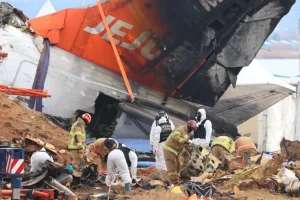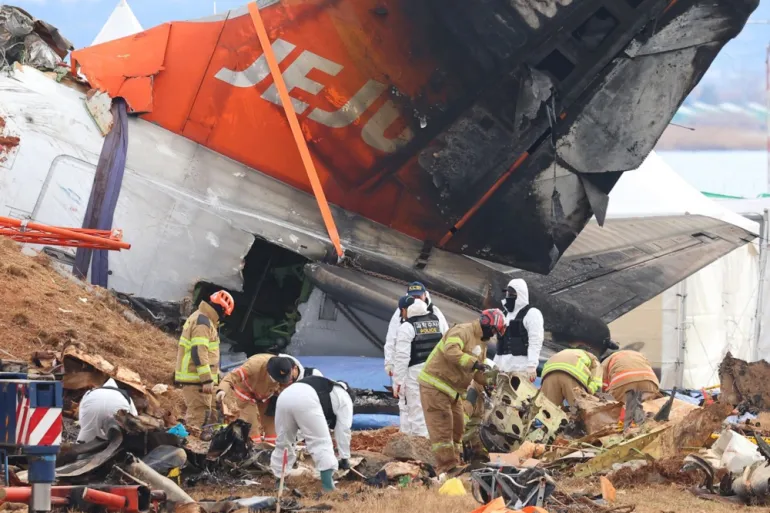
By Adeyemi Adekunle
The fatal crash of Jeju Air’s Flight 7C2216 on December 29, 2024, has left South Korea grappling with the aftermath of its worst-ever aviation disaster. Bound from Thailand to Muan International Airport, the Boeing 737-800 jet crash-landed, collided with a concrete barrier, and exploded into flames, killing 179 of the 181 passengers and crew aboard. The incident has since sparked questions about safety oversight, mechanical failures, and human error.
On January 11, South Korea’s transport ministry made a startling revelation: the aircraft’s black boxes—containing the cockpit voice recorder (CVR) and flight data recorder (FDR)—stopped recording critical data approximately four minutes before the crash. This gap has left investigators with significant uncertainties about the chain of events leading to the disaster.
“The analysis revealed that both the CVR and FDR data were not recorded during the four minutes leading up to the aircraft’s collision with the localiser,” the ministry disclosed. The localiser, a navigation system designed to aid in aircraft landings, was also a physical barrier at the end of the runway. While the localiser contributed to the severity of the crash, investigators are probing why the recordings ceased, with one expert suggesting a complete power loss as a possible cause—an extraordinarily rare scenario in aviation.
Following the initial investigation, the cockpit voice recorder was sent to the United States National Transportation Safety Board (NTSB) after South Korean authorities found the missing data. This missing information has only compounded the tragedy, creating hurdles for determining what exactly went wrong in the flight’s final moments.
The implications of the crash have prompted swift responses. South Korea has ordered extended inspections of Boeing 737-800 jets to assess their safety, while Jeju Air’s chief executive has been prohibited from leaving the country pending the investigation. Families of the victims are demanding accountability from both Jeju Air and regulatory authorities for potential negligence in maintenance protocols and flight operations.
The tragedy has sent shockwaves across South Korea, a nation with a robust aviation safety record. Experts emphasize the need for a rigorous review of safety mechanisms, including redundancies in flight recording systems. As questions about mechanical failures and procedural lapses mount, South Korea’s aviation authorities face growing pressure to implement reforms that prevent such tragedies in the future.
For now, the nation mourns the devastating loss of lives, while investigators worldwide work tirelessly to piece together the puzzle of what transpired during those crucial final minutes of Jeju Air Flight 7C2216.



